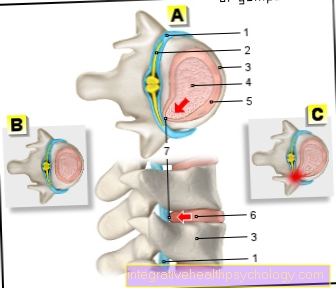Dizziness - Is This a Sign of a Brain Cancer?
introduction
Dizziness is a common symptom that many people suffer from.Since dizziness is mostly projected from the brain or is often caused in the head, some people are connected to the subject of brain tumors. This thought that dizziness could be an indicator of a brain tumor is frightening. This often leads to hypersensitivity and sensitization to all possible changes in the body. It should be remembered that the occurrence of dizziness in most cases is caused by circumstances other than a brain tumor.

How common is a brain tumor causing dizziness?
Dizziness is very common and can be caused by a variety of factors. However, it is extremely rare that a brain tumor is the cause of dizziness. Brain tumors are generally not very common and often present with additional symptoms. So if vertigo is the only symptom in isolation, the likelihood of a brain tumor as the cause is definitely very low. The most common causes of dizziness, on the other hand, are incorrect regulation of blood pressure, for example when the body changes position, or disorders of the organ of equilibrium.
These accompanying symptoms suggest a brain tumor
A brain tumor is a rare disease. It can occur in various places in the brain and accordingly, depending on the size and location, lead to different symptoms. It should always be remembered that not every brain tumor is malignant and associated with a poor prognosis.
In one of the unlikely cases that the occurrence of dizziness is caused by a brain tumor, this symptom can be seen as a kind of general symptom. In addition, there are usually other non-specific symptoms such as headache, nausea and possibly vomiting. These are general symptoms that indicate a structure that is taking up space in the brain. They are also known as intracranial pressure signs and usually appear late in a brain tumor.
Depending on the location and size of the brain tumor, different other symptoms may appear beforehand. Speech disorders are more common, for example, when the tumor is in the left hemisphere. Restrictions in movement or paralysis, as well as problems with walking, epileptic seizures or changes in personality can also be accompanying symptoms of a brain tumor. At this point, however, one should warn against perceiving every symptom as a result of a brain tumor.
More on this: Signs of a brain tumor
diagnosis
If dizziness occurs frequently, this should be clarified by a doctor. There are various causes that can cause dizziness. In order to clarify this in more detail, the anamnesis, i.e. the doctor-patient conversation, is of great importance. This usually leads to a suspicion of a probable possible cause. Accordingly, further examinations, such as tests for diseases of the inner ear or a long-term blood pressure measurement, can then be carried out. If a brain tumor is suspected, the safest examination method is an MRI of the head.
MRI of the head
A head MRI is the safest way to diagnose a possible brain tumor. Here, the brain tissue can be represented more precisely and changes can be recognized well. In this context, the search for a space occupation is usually spoken of, since a brain tumor is a structure that itself requires space and thereby displaces surrounding structures. Another space-occupying cause, such as an abscess, can also be diagnosed with an MRI of the head. However, since an MRI of the head is a complex examination, it must be carefully considered beforehand whether this is really necessary.
How do you deal with the fear that the vertigo could be a brain tumor?
It is more and more common that when various symptoms appear, a malignant cause is quickly suspected. The reason for this is obvious - it is the fear of falling seriously ill or even dying. Nowadays there is also the ever increasing role of information gathering. There are many pages on the Internet which, after reading them, will only increase the fear that has already existed. Therefore, if a symptom occurs, you should urgently not research whether this could be caused by a tumor. Dizziness can be caused by a brain tumor, that is true. However, it should not be ignored with this thought that this is extremely rare.
Usually other causes are responsible. The fear of a brain tumor often severely restricts everyday life. In order not to let things get that far, intensive research in search of the tumor should be avoided. Instead, reputable sources of information, such as your family doctor or a family doctor friend, should be consulted. The occurrence of dizziness can usually be brought under control with various home remedies. If the fear of a brain tumor becomes too limiting, psychotherapeutic treatment should be considered.







.jpg)





















